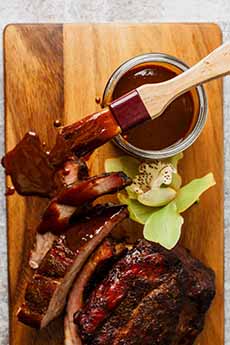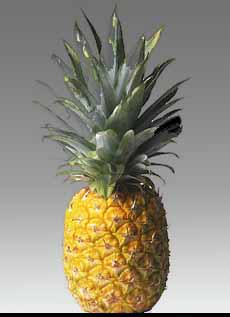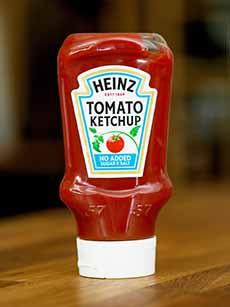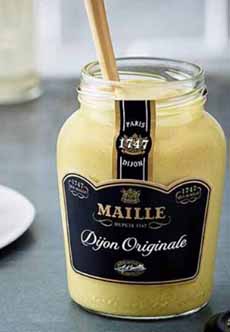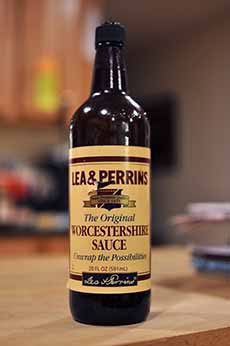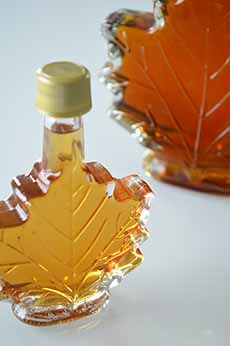Pineapple Rum BBQ Sauce & More Recipes For National Barbecue Month
|
May is National Barbecue Month, and May 16th is National Barbecue Day. What better way to celebrate than by making your own barbecue sauce. Today’s featured recipe is a Pineapple Rum urbon BBQ Sauce made with dark rum. There are additional links below to more recipes that use beer, bourbon, cola, and dark chocolate. Barbecue sauce is the number one product we receive over the transom (i.e., unsolicited). Living in an apartment with no outdoor space to barbecue, it’s not a product we used much—until it started to arrive in droves a few years ago. The majority of the products we taste are perfectly fine, but not special enough to write about. Most are made from ketchup or tomato paste, vinegar, a sweetener (often high fructose corn syrup—HFCS), salt, onion powder, other spices (including cayenne or another chile), molasses, and maybe some mustard. So when we made the Pineapple Rum BBQ Sauce recipe below, our tastebuds were dazzled. But before we introduce the recipe… People often ask about the correct spelling: Is it barbecue, barbeque bar-b-que, or BBQ? The answer is that barbecue and barbeque are alternative spellings, and BBQ and Bar-B-Q are abbreviations. According to Grammarist, “barbecue gained clear ascendancy in the late 19th century, and it has gone unchallenged ever since.” We chose to use “barbecue” in THE NIBBLE because more of its professional standing with barbecue groups and publishers. But in terms of how “America” spells it, a Google search done today shows: Kōloa Rum, which created the featured recipe, spells it BBQ. We honor their spelling in their recipe. Barbecue Trivia: The word “barbecue” comes from the Haitian Arawakan word “barbakoa,” meaning “framework of sticks.” It refers to a raised wooden structure used to either sleep on or cure meat. > The history of barbecue, which dates to prehistory. > See the different types (styles) of barbecue sauce, below. >There are more barbecue sauce recipes, below. The dark rum used in this recipe has notes of vanilla, dark chocolate, and espresso, making it a delicious sipping rum. You can also pour it over ice cream. Dark rum, also called black rum, is aged after distilling, typically in charred oak or barrels, for three to five years. Aging in wood creates a darker color and bolder flavor. The longer the aging, the darker the color and the more intense the flavor. (Caveat: faux dark rum can be made by the addition of molasses, burnt sugar, or caramel.) Kolōa Rum Company’s Rum & Pineapple BBQ Sauce is a real treat. The dark rum and fresh pineapple create a delicious, complex, superior flavor. Once you see how easy it is to make barbecue sauce, you may never buy another bottle. For more Kōloa rum recipes, visit KololaRum.com. 1. MIX all ingredients in a blender and pulse to desired consistency. 2. POUR into a small saucepan and bring to boil, allowing the sauce to cook down and darken in color. 3. POUR into a jar. The sauce will keep for 3-4 days in the fridge. It’s that time of year when we Northerners polish the grill, buy loads of charcoal, and stock up on meat for those outdoor barbecues. And what barbecue is complete without that sweet, tangy, smoky condiment we call barbecue sauce? Different regions developed different styles of barbecue sauce, so there’s a lot from which to choose. Whether it’s Carolina-, Kansas City- or Texas-style or a simple mop sauce or marinade, almost every grill master has some form of barbecue sauce at hand. Here’s a quick comparison of the major barbecue sauce types. All are based on tomato paste (or in cheaper recipes, ketchup): MORE BARBECUE SAUCE RECIPES |
|
|
|
ABOUT KOLOA RUM COMPANY Established in 2009, Kōloa Rum Company produces artisanal, single-batch Hawaiian rum and ready-to-drink cocktails at its distillery in Kalāheo, Kaua’i and operates Hawai’i’s first distilled spirits Tasting Room and Company Store. The company’s award-winning portfolio includes its premium Kaua’i White, Gold, Dark, Spice, Coconut, Coffee, Cacao, and Aged rums, in addition to a collection of delicious ready-to-drink cocktails. Products are available for purchase online, at select retailers nationwide, as well as in Australia, Canada, and Japan. For more information, visit KoloaRum.com. ________________ *Hawaiian vowels—Ā ā, Ē ē, Ī ī, Ō ō, Ū ū—are not treated as separate letters, but are alphabetized immediately after unaccented vowels. Here’s more about the Hawaiian alphabet. The straight bar placed above a letter (usually a vowel) is called a macron. Its name derives from Ancient Greek μακρόν (makrón) “long,” since it was originally used to mark long or heavy syllables in Greco-Roman metrics. It now more often marks a long vowel.
|
||
